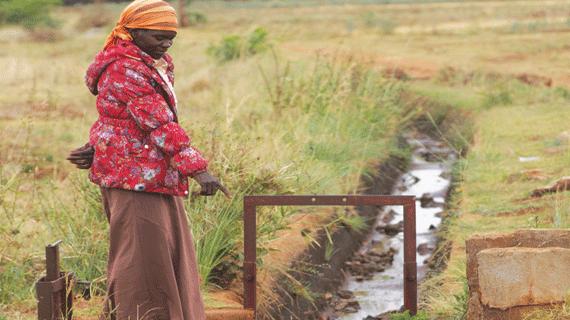News / National
Zinwa disconnects supplies to irrigation scheme, demands US$300 each from rural folk
05 Dec 2023 at 20:40hrs |
1595 Views

The maize crop at Silalatshani Irrigation Scheme in Insiza South, Matebeleland South province, is wilting before maturity after the Zimbabwe National Water Authority disconnected water supplies due to an estimated US$255 000 debt.
The farmers said water was disconnected last month and they were ordered to pay about US$300 each by the end of this month to offset the debt.
"We have a serious problem. They disconnected water to the irrigation scheme and we were advised to pay US$300 each by the end of this month. Silalatshani is the sole breadbasket (of the area), if the water is disconnected people will die of starvation," said one farmer who preferred anonymity.
The farmers expressed fears that the government and local leadership wanted to stop the smallholder farmers from farming at the irrigation scheme and turn it into an Agricultural Rural Development Authority (Arda) project.
"The maize crop is drying before maturity because of the disconnection and farmers are likely to lose out heavily if no solution is found to end the water disconnections. We appeal to authorities to intervene and assist us as a matter of urgency," said one of the plot holders.
Another farmer said the water was disconnected in the second week of November, hence the maize crop had wilted such that they would not harvest anything.
"This year there will be serious starvation in our area. Even if the water supplies are restored it will not help, the crops have dried out," said the plot holder.
Zinwa spokesperson Marjorie Munyonga promised to respond to questions sent to her, but she was yet to respond at the time of going to print.
In 2019, Silalatshani Irrigation Scheme experienced the same problems when Zinwa disconnected water at the end of August due to very low levels at the scheme's supply dam.
Chief Sibasa, born Bekezela Sibanda, under whose jurisdiction the scheme falls revealed the challenges that were being faced by plot holders.
Chief Sibasa is also a plot holder at the irrigation scheme.
Silalatshani Irrigation Scheme has been a lifeline for villagers in Filabusi and surrounding areas for the past 54 years but due to recurrent droughts, farming activities have been seriously affected.
In the past when Silalatshani Dam water level deteriorated, the farmers would be aided by Bulawayo City Council (BCC), which supplied water from Lake Cunningham. BCC is also facing water challenges, hence council could not assist them.
The irrigation scheme has 853 farmers, with one farmer holding a maximum of two hectares, producing maize, beans and other crops. During winter, the farmers produce cash crops such as vegetables and wheat, among others.
If the 853 plot holders pay US$300 each, this translates to US$255 900.
Silalatshani Dam also supplies water to JZ Moyo High School, Colleen Bawn town and Ekusileni Mission.
The farmers said water was disconnected last month and they were ordered to pay about US$300 each by the end of this month to offset the debt.
"We have a serious problem. They disconnected water to the irrigation scheme and we were advised to pay US$300 each by the end of this month. Silalatshani is the sole breadbasket (of the area), if the water is disconnected people will die of starvation," said one farmer who preferred anonymity.
The farmers expressed fears that the government and local leadership wanted to stop the smallholder farmers from farming at the irrigation scheme and turn it into an Agricultural Rural Development Authority (Arda) project.
"The maize crop is drying before maturity because of the disconnection and farmers are likely to lose out heavily if no solution is found to end the water disconnections. We appeal to authorities to intervene and assist us as a matter of urgency," said one of the plot holders.
Another farmer said the water was disconnected in the second week of November, hence the maize crop had wilted such that they would not harvest anything.
"This year there will be serious starvation in our area. Even if the water supplies are restored it will not help, the crops have dried out," said the plot holder.
Zinwa spokesperson Marjorie Munyonga promised to respond to questions sent to her, but she was yet to respond at the time of going to print.
Chief Sibasa, born Bekezela Sibanda, under whose jurisdiction the scheme falls revealed the challenges that were being faced by plot holders.
Chief Sibasa is also a plot holder at the irrigation scheme.
Silalatshani Irrigation Scheme has been a lifeline for villagers in Filabusi and surrounding areas for the past 54 years but due to recurrent droughts, farming activities have been seriously affected.
In the past when Silalatshani Dam water level deteriorated, the farmers would be aided by Bulawayo City Council (BCC), which supplied water from Lake Cunningham. BCC is also facing water challenges, hence council could not assist them.
The irrigation scheme has 853 farmers, with one farmer holding a maximum of two hectares, producing maize, beans and other crops. During winter, the farmers produce cash crops such as vegetables and wheat, among others.
If the 853 plot holders pay US$300 each, this translates to US$255 900.
Silalatshani Dam also supplies water to JZ Moyo High School, Colleen Bawn town and Ekusileni Mission.
Source - southern eye
Join the discussion
Loading comments…



























